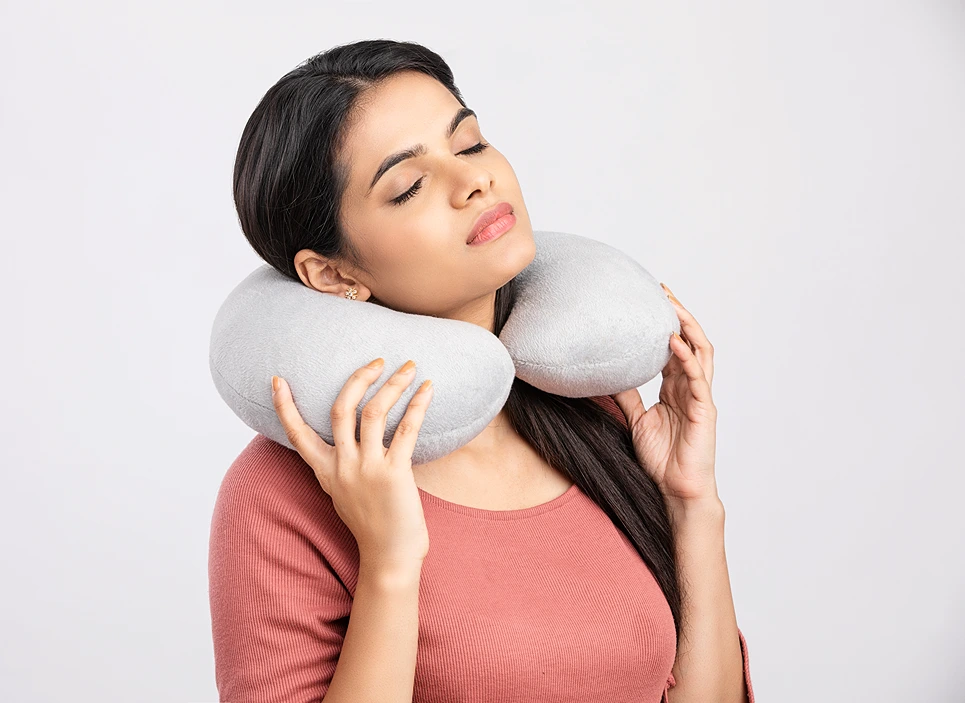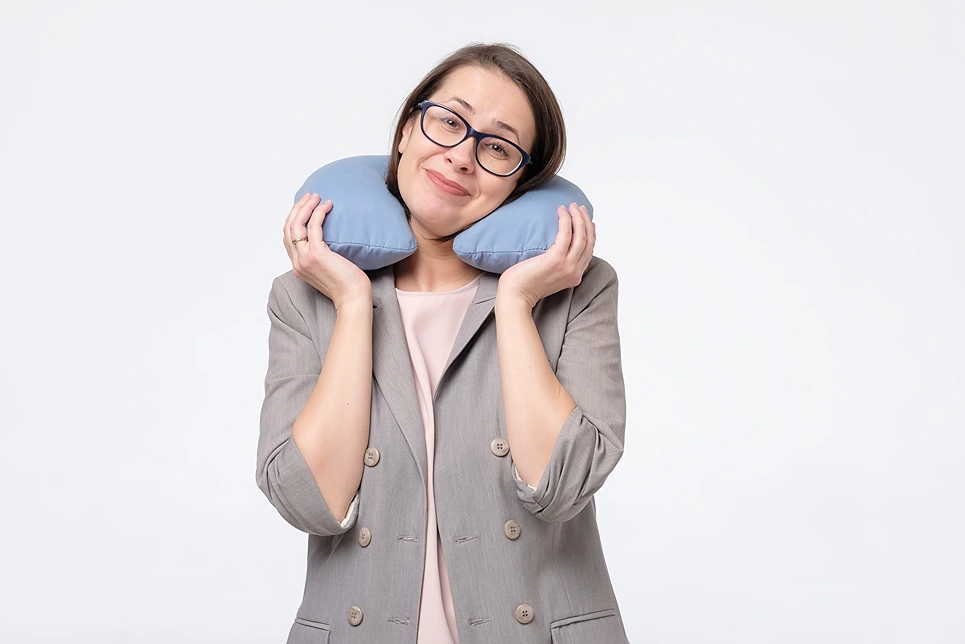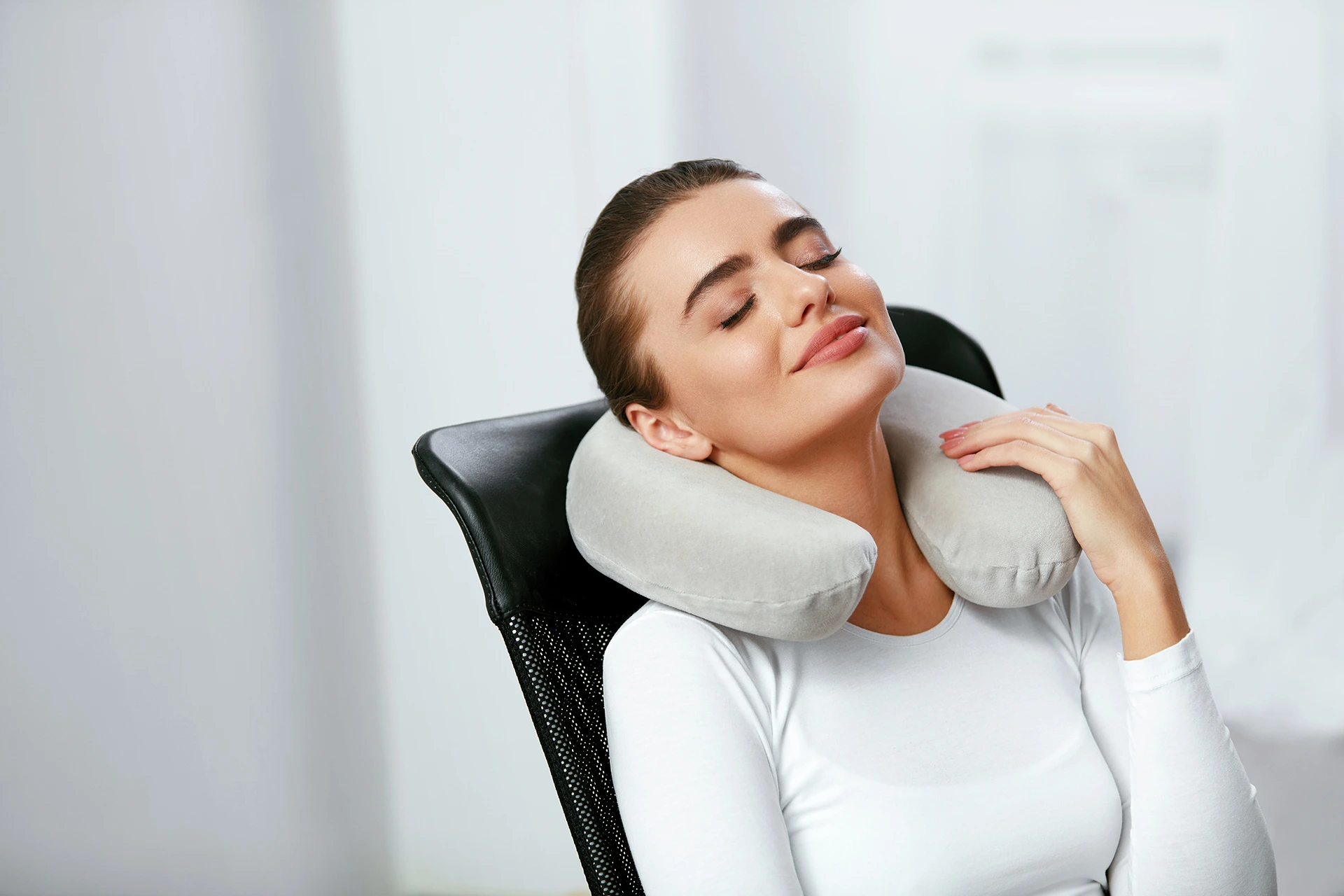Neck pain is an exceedingly common problem that affects people of all ages. From poor posture to injuries and medical conditions, there are many potential causes of neck discomfort.
While remedies like heat, massage, and pain medication can provide temporary relief, using the right neck pillow can make a real difference when it comes to alleviating neck pain and preventing it from recurring.
However, with so many types of neck pillows available, how do you know which one is right for you?
The key is taking a personalized approach. Just as each individual requires tailored medical care based on their unique health profile, finding the perfect neck pillow depends on your specific needs and preferences.
Get targeted relief for your neck pain with Kaly – where the right medical provider makes all the difference.
How Do Neck Pillows Relieve Pain?

Neck pillows can promote pain relief and comfort in several ways:
- Supporting alignment: Neck pillows keep the head, neck, and spine properly aligned while sitting or lying down. This prevents muscle strain.
- Cradling the neck: The cushioning and contouring of neck pillows cradle the neck to reduce pressure points.
- Improving sleep: Supportive neck pillows enhance sleep quality by keeping the neck comfortably supported. Better sleep reduces pain.
- Allowing muscles to relax: A neck pillow permits neck muscles to fully relax while resting, facilitating healing.
The key is choosing a pillow that provides adequate support and contouring without forcing the neck into an unnatural position. Like finding the right doctor for your health needs, the perfect neck pillow matches your anatomy and needs.
What Are the Different Types of Neck Pillows?
Neck pillows come in various types, each offering unique benefits:
Memory Foam Neck Pillows
These pillows adapt precisely to the shape of your neck and shoulders, distributing weight evenly and reducing pressure points. The memory foam retains body heat, ensuring the pillow remains soft and pliable, which is particularly beneficial for relieving pain and stiffness.
Inflatable Neck Pillows
These pillows offer adjustable firmness through air inflation or deflation. This feature makes them perfect for travel, as they can be easily adjusted to suit different sitting positions. Some inflatable pillows also have extra air chambers, allowing for more customized support.
Orthopedic Neck Pillows
Specifically designed for therapeutic support, orthopedic neck pillows often feature an ergonomic shape with contoured ridges. They support the neck’s natural curve, ensuring proper spinal alignment and preventing muscle strain.
Buckwheat Neck Pillows
Filled with natural buckwheat hulls, these pillows can be molded for personalized support. The buckwheat filling also offers excellent temperature regulation, making these pillows a great option for those who prefer natural materials over foam.
Microbead Neck Pillows
Filled with tiny plastic microbeads, these pillows are soft and conform easily to the neck. They retain body heat and are highly portable. However, it’s worth noting that microbead fill can flatten over time, which may reduce support.
Each type of neck pillow caters to different preferences and needs, making it important to choose one that aligns with your specific requirements for comfort and support.
What Factors Should You Consider When Choosing a Neck Pillow?

When selecting a neck pillow, it’s crucial to consider several factors to ensure it meets your specific support needs:
Construction and Materials
The pillow’s materials and build quality are fundamental. Opt for higher-density foams for better shape retention. For materials such as buckwheat or microbeads, a durable outer cover is important. Removable, washable covers enhance hygiene, while inner contours and ridges offer ergonomic benefits.
Firmness and Density
Your weight and sleep position dictate the ideal firmness. Heavier individuals and side sleepers generally require firmer pillows to bridge the gap between the neck and mattress.
Conversely, lighter or back sleepers might prefer softer options. Experiment with different densities to discover the perfect balance between comfort and support.
Neck Curvature Support
Ensure the pillow height and shape appropriately support your neck’s natural curve, maintaining alignment with the spine. Avoid pillows that are too flat or excessively thick, as they can lead to neck strain.
Size and Sleeping Habits Compatibility
Measure your neck and consider your body frame and sleeping habits. A broader pillow might be necessary for side sleepers or those who move frequently during sleep. Compact pillows are ideal for travel.
Shape and Sleeping Position
The pillow’s shape should complement your preferred sleeping position. Wedge-shaped pillows are suitable for back sleepers, rolled or tubular designs benefit side sleepers, and contoured or hourglass shapes are versatile for combination sleepers.
By carefully evaluating these aspects, you can find a neck pillow that matches your needs, similar to how assessing your health profile helps in choosing the right medical provider.
How Do Personal Factors Influence Neck Pillow Choice?

Beyond basic construction and design factors, your individual needs, health conditions, and personal preferences should guide your neck pillow selection.
What Is Your Dominant Sleeping Position?
Side sleepers need a high loft and firm support to keep the neck aligned. Back sleepers need a thinner, softer pillow that fills the neck gap. Stomach sleepers may forego a pillow entirely.
Do You Have Any Pre-Existing Conditions like Arthritis or Injuries?
Certain medical conditions increase sensitivity to improper alignment and pressure points. Targeted support through memory foam or buckwheat may provide relief.
What Texture and Temperature Do You Prefer?
Some people like conforming foam, while others favor fluffier down or microbeads. Temperature-sensitive individuals can opt for breathable buckwheat or moisture-wicking covers.
When and Where Will You Use the Pillow?
Frequent travelers may benefit from compact, inflatable pillows. Use a supportive pillow both when sleeping and for daytime couch sitting to alleviate pain.
Do You Tend to Switch Positions or Move Around?
Combination sleepers need pillows with flexibility that re-contours after moving. Side-specific pillows won’t work as well.
The ideal neck pillow suits your dominant sleep position, health needs, comfort preferences, and lifestyle. Evaluating your profile ensures personalized comfort and pain relief.
Kaly is your ally against neck pain, connecting you with medical providers who cater to your specific health needs.
Comprehensive Guide to Popular Ergonomic Neck Pillows
Here is a detailed table summarizing some of the most popular and highly-rated ergonomic neck pillows, along with their key features and descriptions:
| Pillow Name | Description | Key Features |
| Tempur-pedic Tempur Medium Neck Pillow | Supports the natural curve of head and neck, made of contouring memory foam, ergonomically designed. | Ergonomic shape, memory foam |
| Epabo Contour Memory Foam Pillow | Affordable, provides excellent support for neck pain. | Contour memory foam, affordable |
| Eli & Elm Side Sleeper Pillow | Designed for side sleepers, ensures neck and back alignment. | Side sleeper design, aligns neck and back |
| Elviros Cervical Memory Foam Pillow | Specifically supports the cervical spine, suitable for neck pain. | Cervical support, memory foam |
| Coop Home Goods Original | Adjustable support, flexible for different sleep positions. | Adjustable, suitable for all positions |
| IKEA Rosenskärm Ergonomic Pillow | Great value, good support for neck pain. | Value option, ergonomic |
| Core Products Tri-Core Cervical Pillow | Ideal for back and side sleepers, offers varied support levels. | Varied support, for back/side sleepers |
| Cushion Lab Ergonomic Travel Neck Pillow | Designed for travel, asymmetrical design with high-density foam. | Travel-friendly, asymmetrical design |
This guide is designed to help you understand the different options available and choose a neck pillow that best suits your individual needs and preferences.
How Should You Care for Your Neck Pillow?
To maximize the longevity and effectiveness of your neck pillow, follow these care tips:
- Allow new foam pillows to air out for a few days to let any manufacturing odors dissipate.
- Wash removable covers frequently using mild detergent and cool water delicate cycles. Line dry.
- Spot clean memory foam or microbead pillows with a damp cloth and mild soap. Do not immerse in water.
- For buckwheat hull pillows, periodically massage and redistribute fill for even shaping.
- Replace any pillow that loses notable loft and density. Frequent fluffing can temporarily revive a flattened pillow.
- Avoid exposing pillows to direct sunlight or heat which can damage materials.
- When traveling, use a protective bag or cover to keep your pillow clean.
Proper maintenance keeps your neck pillow hygienic and optimizes its pain relieving abilities. Replace worn pillows annually to ensure ideal comfort and support.
Finding Your Perfect Neck Pillow for Personalized Comfort

Just as each person requires medical care tailored to their health status and needs, finding the ideal neck pillow depends on your anatomy, sleep habits, and lifestyle.
Consider what type of material, firmness, and size will best support your neck’s natural curve and keep you comfortable in your favorite sleeping position. Take into account any preexisting medical conditions when choosing your pillow.
Approaching neck pillow selection with the same personalized focus as choosing a doctor through Kaly will ensure you find the option that reduces your neck pain, improves sleep quality, and enhances your overall well-being. Don’t settle for a generic pillow. Find the neck support that is uniquely right for you.
Experience personalized care for your neck pain with Kaly – where finding the right medical provider is as essential as the air we breathe.
FAQs on Neck Pillows for Optimal Neck Pain Relief
Does the ergonomic shape of a neck pillow significantly impact neck pain relief for different sleeping positions?
Yes, an ergonomic shape in a neck pillow is crucial as it ensures proper support and alignment of the neck, catering to different sleeping positions and effectively reducing neck pain.
What are the benefits of a contoured pillow over a traditional flat pillow for neck support?
Contoured pillows are specifically designed to support the natural curvature of the neck, providing better alignment and relief from neck pain, unlike traditional flat pillows that may cause the neck to bend unnaturally.
How can a neck pillow assist in maintaining neutral spine alignment for back sleepers with neck pain?
A neck pillow for back sleepers is designed to fill the gap between the neck and the mattress, helping to maintain a neutral spine alignment, thereby reducing the strain and discomfort associated with neck pain.
Is there an ideal type of pillow for neck support specifically for people with stiff neck symptoms?
Individuals with a stiff neck might benefit from a memory foam or cervical pillow that offers firm support and contours to the neck, helping to alleviate stiffness and maintain proper alignment.
For hot sleepers with neck pain, what type of pillow should they consider for both comfort and support?
Hot sleepers with neck pain should consider pillows with breathable materials, such as buckwheat or gel-infused memory foam, which provide neck support while also facilitating air circulation to keep them cool.
How does a pillow for neck pain cater to a stomach sleeper’s needs?
For stomach sleepers, a thinner pillow or sometimes no pillow at all is recommended to keep the spine in a neutral position, reducing the risk of neck pain.
What should be the ideal firmness level of a neck pain pillow for side sleepers?
Side sleepers generally benefit from a firmer pillow to fill the gap between the neck and the mattress, ensuring the neck and spine remain aligned and relieving neck pain.
